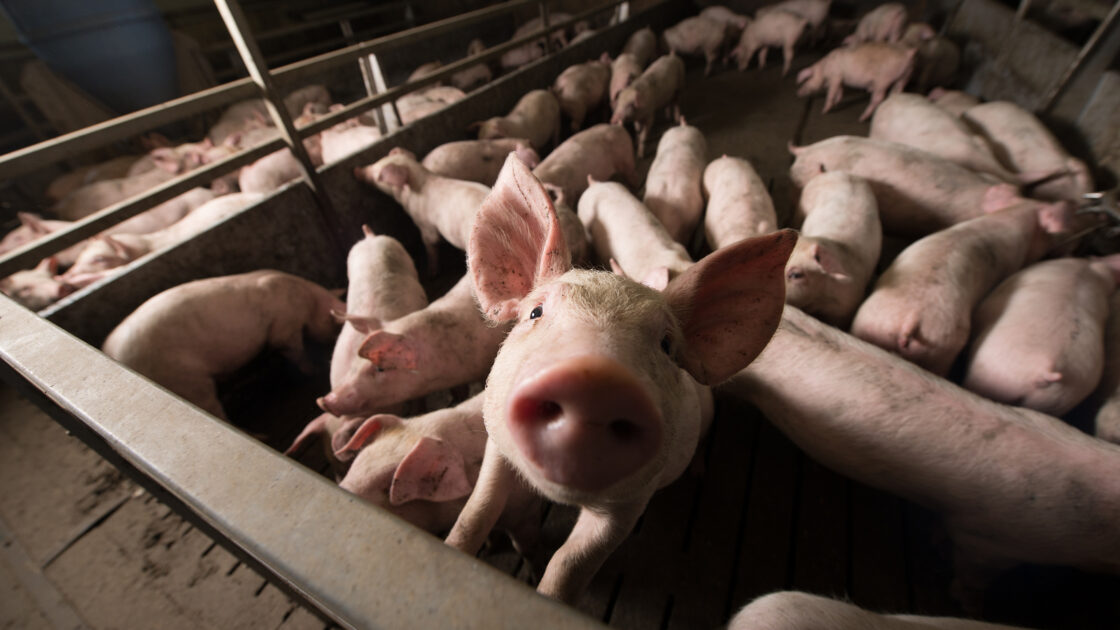Iconic Soap Company Steps Up for Animal Welfare Issues

Dr. Bronner’s, the leading brand of natural soaps known for its iconic labels and “All-One” philosophy as well as a commitment to numerous social and political causes, has pledged more than $500,000 this year to support animal advocacy and animal welfare efforts, the company announced this week.
Funding has gone to animal advocacy organizations that focus specifically on reducing the suffering of farm animals, as well as supporting education efforts and more sustainable food options.
“As a dedicated vegan, I’m proud that my family is committing resources over the long-term to take on the terrible plight of farm animals and to promote more compassionate and sustainable dietary choices,” David Bronner, Cosmic Engagement Officer of Dr. Bronner’s, said in a statement. “One doesn’t have to be vegan to want to reduce the incredible suffering of animals in factory farms and to lower overall meat consumption,” Bronner adds.
According to Dr. Bronner’s, vegetarian advocacy and animal welfare are core focuses for the company, which has also been outspoken in its support of GMO labeling, legalizing hemp farming, drug policy reform, and fair trade.
The Plant Based Food Association and the Good Food Institute are two of the organizations receiving funding from Dr. Bronner’s.
“Dr. Bronner’s gave The Good Food Institute the support we needed out of the gate, while we were still proving concept and before we’d even officially launched the organization, and that gave us the momentum and the confidence we needed to accelerate,” Bruce Friedrich, Executive Director of The Good Food Institute (GFI), said in a statement. “One especially great thing about Dr. Bronner’s support is that the Dr. Bronner’s team act as partners to GFI—they are helping us to think through our strategy as well as the technologies we’re supporting and how they can be as ethical as possible, and they’re joining us in all aspects of our work on behalf of a food system with integrity. We appreciate their financial support, of course, and we also treasure their moral and strategic partnership,” said Friedrich.
The Plant Based Food Association, which also launched this year, is the first trade organization representing the leading producers of plant-based alternatives to traditional meat, eggs, and dairy products.
“We are proud and grateful to have the support of Dr. Bronner’s,” said Michele Simon, Executive Director of Plant Based Foods Association. “Not many donors are willing to take a chance on a new organization, but our missions are clearly aligned, which makes for an exciting partnership,” she noted.
“Having such a strong industry leader as Dr. Bronner’s an early supporter gave us the momentum we needed to reach out to other potential members and sponsors.”
Bronner’s also lent its support to the YES on 3 Campaign in Massachusetts, poised to end the controversial confinement of veal calves, egg-laying hens, and pigs in that state.
“Dr. Bronner’s is a powerful ally in helping wage and win the YES on 3 ballot campaign in Massachusetts. If passed, this will be the most important farm animal protection law in the nation, requiring that all the eggs, veal, and pork sold in the state come from cage-free sources,” said Paul Shapiro, Vice President of Farm Animal Protection at the Humane Society of the United States. “In these ballot campaigns, being right is never enough; we have to have the resources needed to win. And Dr. Bronner’s is a big part of helping make history in Massachusetts with Question 3.”
Other recipients include the forthcoming film version of Jonathan Safran Foer’s book, “Eating Animals”; and organizations including The Humane League, Mercy for Animals, Factory Farming Awareness Coalition, PETA, Our Hen House, Gentle Barn, Poplar Spring and Vine Sanctuary in the United States, as well as the international work of Sea Shepherd and Compassion in World Farming.
“Looking forward, Dr. Bronner’s is particularly keen to help power and coordinate the animal welfare and regenerative organic movements, in their common aim to end the horribly cruel and unsustainable factory farming of animals, fed by monoculture deserts of carbon and water-intensive grain,” adds Bronner. “One-third of the Earth’s land surface is covered in arable farm and range land. Regenerative practices can restore soil health and organic matter relatively quickly, and coupled with a global commitment to eating much less but much more humane and sustainably raised animal products, can also significantly mitigate climate change.”
Find Jill on Twitter and Instagram
Related on Organic Authority
Vegan Meat is Now the Biggest Trend in the Tech Industry
Eating Red Meat Makes You as Fat as if You Were Guzzling Sugar
GMO Safety Myth Challenged by New GMO Fact Check Website

